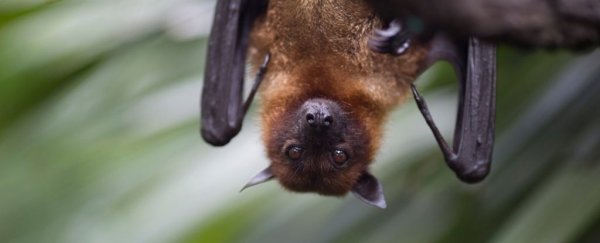Bats appear to be born with something akin to a superpower: a preternaturally accurate sense of time, new research suggests.
From their very first flight, these echolocating mammals seem to somehow know exactly how long it usually takes for the sound waves of their calls to bounce off prey and echo back to them, researchers found.
This innate reference point for the typical speed of sound allows them to judge distances in units of time, as opposed to units of space like we do. An insect buzzing near the opening of a cave is thus not a meter ahead of a bat, but more like a five-millisecond flight away.
“This may sound like a semantic difference, but I think that it means that their spatial perception is fundamentally different than that of humans and other visual creatures, at least when they rely on sonar,” says zoologist and neuroscientist Yossi Yovel from Tel Aviv University in Israel.
Unlike humans, who rely heavily on sight, many different kinds of bats ‘see’ the world around them with their ears. Yet just as our own eyes can deceive us, bats don’t always interpret their echoes correctly.
When researchers manipulated the usual speed of sound in air, they found they could mess with the focus of a bat’s flight.
In the experiment, the team raised six newborn bat pups in normal atmospheric conditions, as well as five newborn pups in helium-enriched air, which increases the speed of sound.
These two groups then had their echolocating abilities tested in their respective environments. When approaching a target of food, the pups in the helium-enriched air – or the ‘Heliox pups’ – showed the same echolocating patterns and flying behavior as the pups in normal air – or the ‘air pups’.
Yet because the rebounding calls of the Heliox pups were returning to them faster, these bats got tricked into landing too early.
When a bat flies and lands somewhere, it requires precise coordination of its calls and its body. As the creature comes closer to a target, its echolocation rate increases, and as it slows down to land, it rolls its body and stretches out its legs.
In an environment where the speed of sound travels faster, however, this all happens much faster, causing the bats to land ahead of their target.
Despite multiple attempts, the Heliox pups kept trying to hit their target using a normal speed of sound reference. They never learned from their mistakes.
Meanwhile, the air pups landed right where they planned to.
Together, this suggests bats have an innate sense for the speed of sound at birth, which cannot be altered by learned experience.
Even when adult bats were conditioned to a helium-enriched environment for several days, the researchers found they could not change this fixed reference point.
This is surprising, as sensory learning is an advantage for many animals, especially those whose conditions are likely to change.
In nature, for instance, bats can experience rapid and small shifts in the speed of sound due to temperature changes. Between the heat of summer and the chill of winter, the speed of sound can change by as much as 7 percent – based off the conditions of the Aravah desert where the research was conducted.
Given this range, it seems odd that a bat can’t adapt to slightly different speeds of sound. But as the authors point out, plasticity in the brain can also cost time and energy.
“Because bats need to learn to fly within a short time of their birth,” explains Yovel, “we hypothesize that an evolutionary ‘choice’ was made to be born with this knowledge in order to save time during the sensitive development period.”
Better to have it from the get-go and land a little short on occasion.
The study was published in PNAS.
